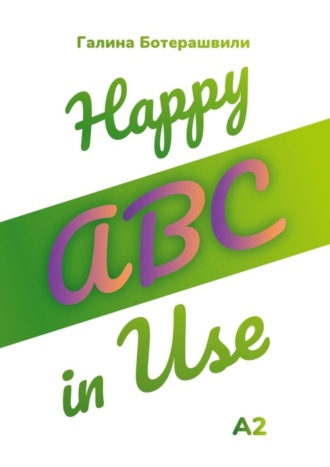
Полная версия
Happy ABC in Use
6. Nowerdays a lot of libraries have shifted their
focus from print materials to digital ones.
……………………………………………………………………………..
……………………………………………………………………………..
7. There was a layer of dust on the carpet.
……………………………………………………………………………..
……………………………………………………………………………..
8. Will you deliver, or do I have to come to the shop
to collect the goods?
……………………………………………………………………………..
……………………………………………………………………………..
9. Dolphins are known to be very clever and friendly
to humans.
……………………………………………………………………………..
……………………………………………………………………………..
10. My father’s favourite hobby is plying draughts.
……………………………………………………………………………..
……………………………………………………………………………..
11. It’s dangerous to go too near the edge of the cliff.
……………………………………………………………………………..
……………………………………………………………………………..
12. If you are looking for alternative to sugar, you can
buy dates.
……………………………………………………………………………..
……………………………………………………………………………..
13. I feel it’s my duty to help them in this dangerous
situation.
……………………………………………………………………………..
……………………………………………………………………………..
14. Prices have risen steadily during the past decade.
……………………………………………………………………………..
……………………………………………………………………………..
15. Speak up! I am rather deaf.
……………………………………………………………………………..
……………………………………………………………………………..
16. Try to describe exactly how it happened.
……………………………………………………………………………..
……………………………………………………………………………..
17. It is known that Georg V belonged to a Royal
dynasty.
……………………………………………………………………………..
……………………………………………………………………………..
18. The most famous fairy tale with dwarfs in is
Snow White and the Seven Dwarfs.
……………………………………………………………………………..
……………………………………………………………………………..
19. Charles Darwin described the idea that plants and
animals develop gradually from simpler to more
complicated forms by natural selection.
……………………………………………………………………………..
……………………………………………………………………………..
20. The seagull dived into the water to catch
the fish.
……………………………………………………………………………..
……………………………………………………………………………..
Exercise 4. Are these sentences true or false? Translate these sentences
1. Dolphins are known to be very clever and hostile
to humans. T / F
………………………………………………………………………………
2. I feel it’s not my duty to help them in this
dangerous situation. T / F
………………………………………………………………………………
3. The most famous fairy tale with dwarfs in is
Snow White and the Seven Dwarfs. T / F
………………………………………………………………………………
4. My father’s favourite hobby is plying chess. T / F
………………………………………………………………………………
5. I want to share some ideas with you on how to
decorate our house for New Year. T / F
………………………………………………………………………………
6. The seagull dived into the water to catch the
dolphin. T / F
………………………………………………………………………………
7. The daffodil is the national flower of Denmark.
T / F
………………………………………………………………………………
8. If you are looking for alternative to sugar,
you can buy dates. T / F
………………………………………………………………………………
9. Their nephew disobeyed his mother and went to
the party. T / F
………………………………………………………………………………
10. There was a layer of dust on the draughts. T / F
………………………………………………………………………………
11. Will you deliver, or do I have to come to the
shop to collect the goods? T / F
………………………………………………………………………………
12. In some countries there is a tradition of a dessert
course to conclude a meal. T / F
………………………………………………………………………………
13. Charles Darwin described the idea that plants
and animals develop gradually from simpler to
more complicated forms by unnatural selection. T / F
………………………………………………………………………………
14. It is known that Georg VI belonged to a Royal
dynasty. T / F
………………………………………………………………………………
15.Prices have risen steadily during the past decade.
T / F
………………………………………………………………………………
16. Denmark is considered not to be one of the most
economically developed countries in the world. T / F
………………………………………………………………………………
17. Nowadays very few libraries have shifted their
focus from print materials to digital ones. T / F
………………………………………………………………………………
18. Speak up! I am rather deaf. T / F
………………………………………………………………………………
19. Don’t try to explain exactly how it happened. T / F
……………………………………………………………………………….
20. It’s pleasant to go too near the edge of the cliff.
T / F
……………………………………………………………………………….
Exercise 5. Translate these sentences using the modal verbs can, may, must
1. Мы должны купить немного букетов из
нарциссов на банкет.
………………………………………………………………………………
2. Вы можете описать достопримечательности
Пекина?
………………………………………………………………………………
3. Они могут украсить потолок шарами?
………………………………………………………………………………
4. Она может доставить эти ковры в Данию.
………………………………………………………………………………
5. Вы можете рассказать нам о династии Чарльза,
принца Уэльского?
………………………………………………………………………………
6. Он должен принести несколько коробок
с шахматами и шашками.
………………………………………………………………………………
7. Мы должны украсить торт финиками и черной
смородиной.
………………………………………………………………………………
8. Можно мне предложить свой вариант десерта?
………………………………………………………………………………
9. Вы можете вернуть долг завтра?
………………………………………………………………………………
10. Вы обязаны доставить этих опасных животных
только через пролив Ла-Манш.
………………………………………………………………………………
Exercise 6. Insert the words in the boxes
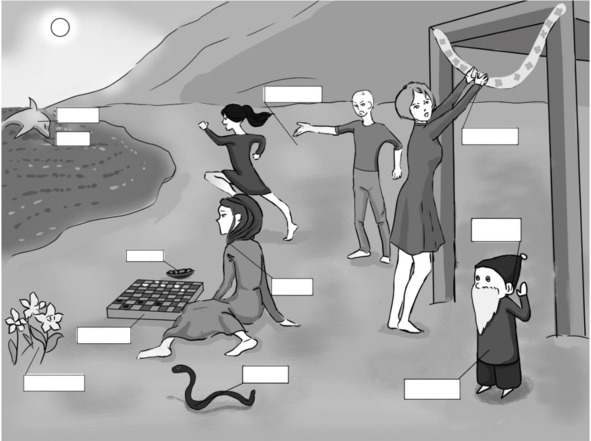
E
Exercise 1. Study the vocabulary
1. be eager (v) [би и: гə] – гореть желанием,
очень хотеть
2. earache (n) ['иəрейк] – боль в ухе
3. earthquake (n) ['ɜ:θкwэйк] – землетрясение
4. east (n) [и: ст] – восток
5. eatable (adj) [и: тбл] – съедобный
6. edge (n) [эдж] – край чего-либо
7. efficiency (n) [и'фишəнси] – эффективность,
продуктивность, КПД
8. Egypt ['и: джипт] – Египет
9. embankment (n) [им'бэнкмент] —
каменная набережная, дамба
10. embroidery (n) [им'бройдəри] – вышивка
11. Empire State Building
[эм'пайер 'стейт 'билдинг] – Эмпайр-стейт-билдинг
12. empty (adj) ['эмпти] – пустой
13. emu (n) ['и: мью: ] – страус эму
14. England (n) ['инглэнд] – Англия
15. The English Channel [инглиш 'чэнэл] —
Английский канал
16. entertain (v) [ентə'тейн] – развлекать
17. envelope (n) ['енвə'лəуп] – конверт
18. eskimo (n) ['ескимəу] – эскимос
19. estate (n) [и'стейт] – поместье
20. eyelashes (n) ['айлэшиз] – ресницы
Exercise 2. Match the columns
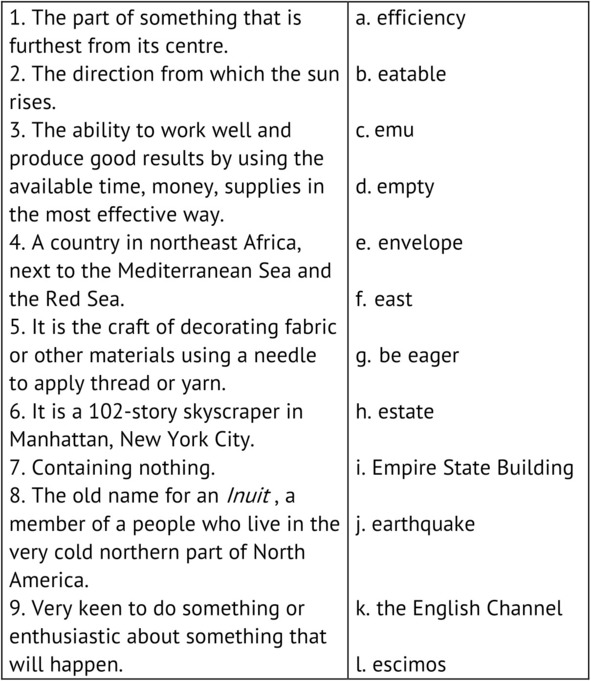
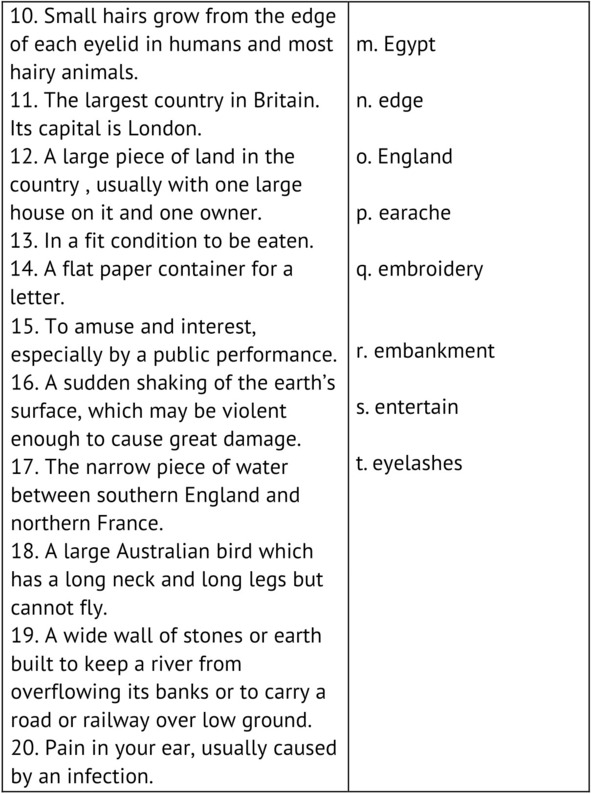
Exercise 3. Complete the sentences.
See exercise 2
1. ……………………………………………… in Manhattan,
New York City.
2. A sudden shaking of the earth’s surface, ….............
.…………………………………………………………………........... .
3. …………………………………………………………….. nothing.
4. A large Australian bird which has .........................
…………………………………………………………………............ .
5. ………………………………………………… by an infection.
6. The narrow piece of water …................................
…………………………………………………………………............ .
7. ………………………………………… most hairy animals.
8. A wide wall of stones or …………………………………
…………………………………………………………………………… .
9. A large piece of land in the country,
…………………………………………………………………………… .
10. .………………………………………………………to be eaten.
11. It is the craft of decorating fabric ……................
……………………………………………………………………..... .
12. The ability to work well .....................................
……………………………………………………………………..... .
13. ………………………………………...............................
part of North America.
14. The direction from ............................................ .
15. The part ………………………………………………………
16. The largest country ….........................................
17. ………………………………………….. and the Red Sea.
16. ..………………………………………………… for a letter.
19. To amuse and interest,
…………………………………………………………………….....
20. ………………….……………………………………………....
something that will happen.
Exercise 4. Match the columns
1. ear… 1. …quake2. embank… 2. …tate3. Eng… 3. …ger4. es… 4. …lashes5. earth… 5. …lish Channel6. emp… 6. …ache7. enve… 7. …land8. Empire… 8. …kimo9. eat… 9. …ty10. enter… 10. …pt11. eye… 11. …ment12. effi … 12. …ciency13. ea… 13. …st14. emb… 14. State Building15. es… 15. …ge16. Egy… 16. …mu17. ea… 17. …tain18. e … 18. …able19. Eng… 19. …roidery20. ed… 20. …lopeExercise 5. Use the general questions. (present, past, future indefinite tenses)
1. Эти финики сьедобные?
………………………………………………………………………………
2. Тебе нравится развлекать туристов?
……………………………………………………………………………….
3. Вы купили вышивку с изображением
Эмпайер-стейт-билдинг?
……………………………………………………………………………….
4. Они обнаружили эту пещеру в Англии в 1995 году?
……………………………………………………………………………….
5. Она хочет приобрести поместье недалеко от
Белфаста?
……………………………………………………………………………….
6. Они будут покупать страусов эму и обезьян для
своего зоопарка?
……………………………………………………………………………….
7. Им нравится ездить на дайвинг в Египет?
……………………………………………………………………………….
8. У нее искусственные ресницы?
……………………………………………………………………………….
9. Это было самое сильное землетрясение в Анкаре?
……………………………………………………………………………….
10. Это племя находилось на востоке Африки?
……………………………………………………………………………….
Exercise 6. Insert the words in the boxes
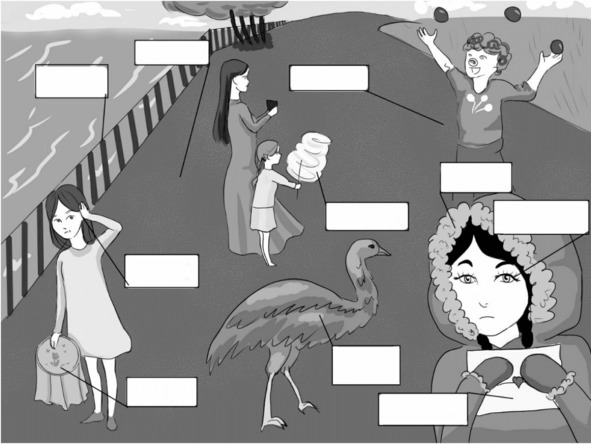
F
Exercise 1. Study the vocabulary
1. fabric (n) ['фэбрик] – ткань
2. facilities (n) [фə'силəтиз] – удобства,
оборудование, средства
3. fail (v) [фэйл] – потерпеть неудачу в чем-либо
4. faint (v) [фейнт] – упасть в обморок, потерять
сознание; слабый (зрение, возможность, надежда)
5. factory (n) ['фэктəри] – фабрика, завод,
промышленное предприятие
6. falcon (n) ['фо: лкəн] – сокол
7. fan (n) [фэн] – веер; фанат; (v) обмахиваться
веером
8. fare (n) [феə] – проездная плата
9. feather (n) ['феðə] – перо (птичье)
10. fever (n) ['фи: вə] – жар, высокая температура
11. finger (n) [фингə] – палец руки
12. fireplace (n) ['файэплейс] – камин
13. fisherman (n) ['фишəмəн] – рыбак
14. fold (v) [фəулд] – сгибать, загибать, складывать
15. forehead (n) ['фо: рид] – лоб
16. frame (n) [фрейм] – рамка для картины, фото
17. fraud (n) [фро: д] – мошенник, обманщик
18. frequently (adv) [ф'рикwəнтли] – часто
19. fuel (n) [фьюəл] – топливо
20. furniture (n) ['фё: ничə] – мебель
Exercise 2. Match the columns
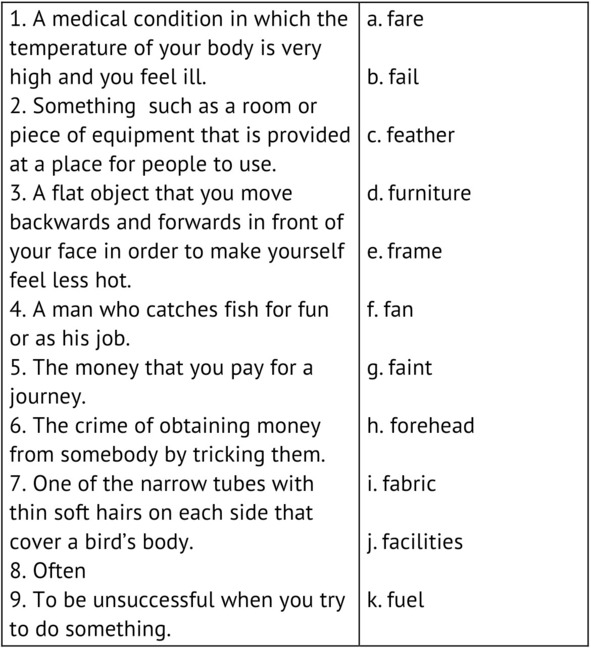
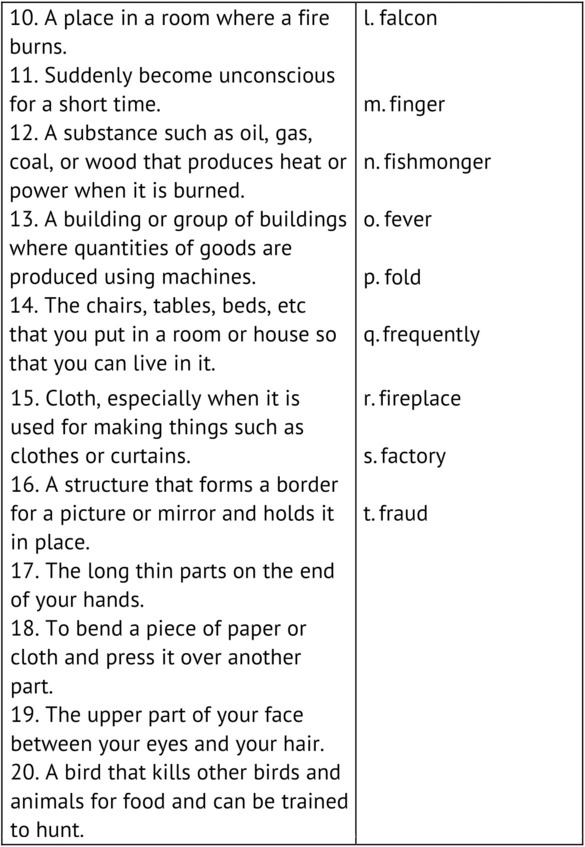
Exercise 3. Make up your own dialogues using these phrases
1. a wide range of furnishing fabrics – широкий
выбор тканей для мебели
2. a training/ leisure facilities – оборудование
для тренировок/отдыха
3. to fail to come in time – опоздать / не смочь
прийти вовремя
4. faint hope – слабая надежда
5. a car factory – автозавод
6. various species of falcons – различные виды
соколов
7. noisy football fans – шумные футбольные фанаты
8. taxi fare – оплата за проезд в такси
9. a feather pillow – перьевая подушка
10. to reduce fever – сбить температуру тела
11. long bony fingers – длинные костлявые пальцы
12. a modern fireplace – современный камин
13. a lot of fishermen on the river – на реке много
рыбаков
14. to fold something in half – свернуть пополам
что-либо
15. a high forehead – высокий лоб
16. a silver photograph frame – серебряная рамка
для фотографий
17. to investigate a complex fraud – расследовать
сложное дело о мошенничестве
18. the most frequently asked questions – самые
часто-задаваемые вопросы
19. a shortage of food and fuel – дефицит еды и
топлива
20. antique furniture – антикварная мебель
Exercise 4. Let’s try these funny tongue twisters
The first fly flies forty-four feet,
The fourth fly flies forty-five feet
The fifth fly flies fifty-four feet
What fly flies fifty-five feet?
A fat Finnish fisher fried for a funny feast on Friday
Forty-four fries, forty-five flukes,
Fifty-four flitches and fifty-five flatfishes
Found freshly in a far fiord.
There was a fisherman named Fisher
Who fished for some fish in a fissure.
Till a fish with a grin, pulled the fisherman in.
And now they’re fishing the fissure for Fisher.
Exercise 5. Use the special questions. (present, past, future indefinite tenses)
1. Когда он потерял сознание?
……………………………………………………………………………
2. Сколько стоит проезд в метро?
……………………………………………………………………………
3. Сколько каминов в этом доме?
……………………………………………………………………………
4. Какую мебель вы хотите приобрести в нашем
магазине?
……………………………………………………………………………
5. Почему Вы думаете, что это были мошенники?
……………………………………………………………………………
6. Сколько рамок для картин вам нужно доставить
в Англию в следующем месяце?
……………………………………………………………………………
7. Где вы познакомились с теми рыбаками?
……………………………………………………………………………
8. Зачем вы согнули эти конверты?
……………………………………………………………………………
9. Когда они будут работать на этой фабрике?
……………………………………………………………………………
10. Сколько соколов живет в этом поместье?
……………………………………………………………………………
Exercise 6. Insert the words in the boxes
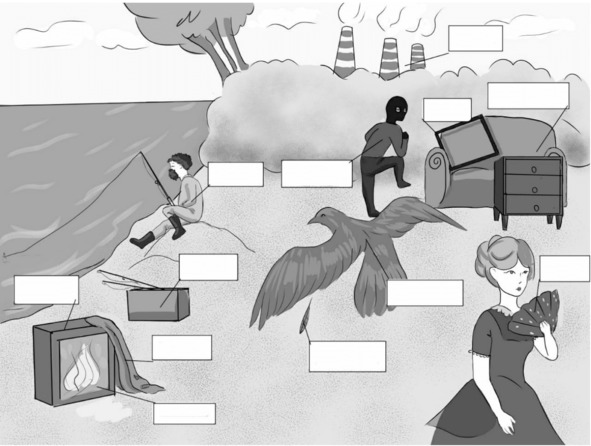
G
Exercise 1. Study the vocabulary
1. gain (n) [гейн] – прибыль, доход, приобретение
(v) – приобретать, получать
2. gap (n) [гэп] – пробел, расхождение во взглядах,
утрата, окно в расписании, ущелье
3. garlic (n) ['га: лик] – чеснок
4. gate (n) [гейт] – ворота, калитка, выход
5. gather (v) ['гэðə] – собираться группой,
собирать что-либо
6. generation (n) [джəнə'рейшн] – поколение
7. gentle (adj) [джентл] – мягкий, добрый
8. gift (n) [гифт] – подарок
9. glove (n) [глав] – перчатка
10. GMO (s) – [джи эм 'оу] ГМО
(генетически модифицированный организм)
11. gown (n) [гаун] – платье (для особых случаев:
бал, свадьба), мантия, халат врача
12. grass (n) [гра: с] – трава
13. greasy (adj) [гри: зи] – жирный, маслянистый
14. grind (v) [грайнд] – молоть, перемалывать
15. guard (n) [га: д] – охранник
16. guess (v) [гэс] – догадаться, угадать,
додуматься
17. guilty (adj) [гилти] – виновный, провинившийся
18. guitar (n) [ги'та: ] – гитара
19. gun (n) [ган] – пистолет
20. gym (n) [джим] – спортивный зал
Exercise 2. Match the columns
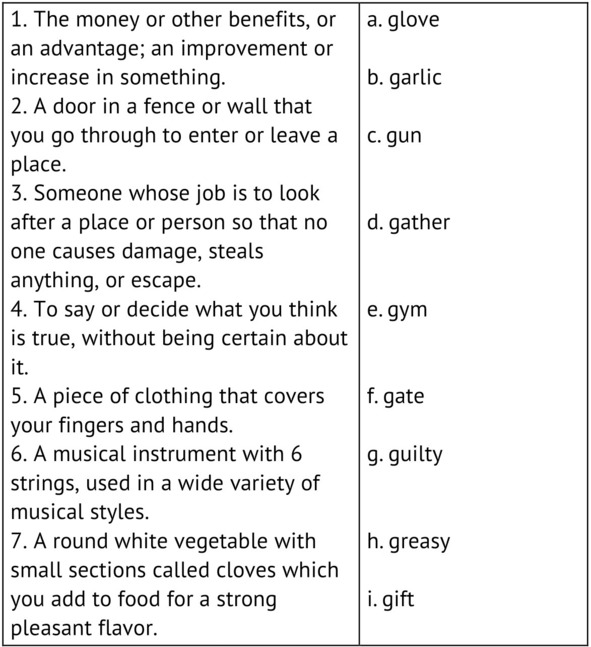
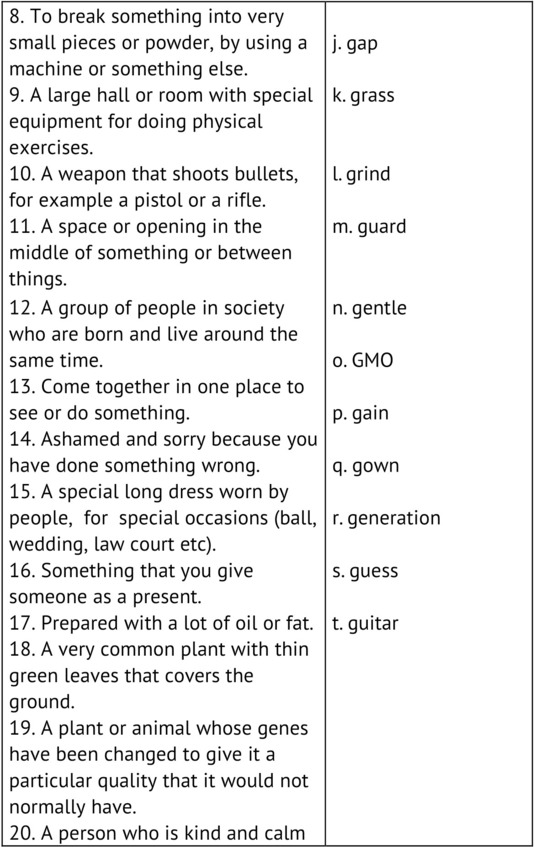
Exercise 3. Remember these proverbs and sayings and make up short dialogues or stories using them
1. No pain no gain.
Без труда не выловишь и рубку из пруда.
2. A guilty conscience needs no accuser.
Нечистой совести обвинитель не нужен.
3. A rolling stone gathers no moss.
Катящийся камень мхом не обрастает.
4. Never look a gift horse in the mouth.
Дареному коню в зубы не смотрят.
5. The grass is always greener on the other side
of the hill.
Хорошо там, где нас нет.
Exercise 4. Translate these sentences
1. She hopes ……………… (получать) experience
by working abroad for a year.
………………………………………………………………………………
2. His death leaves a huge ……………….. (утрата) in
the theatrical life of Belfast.
……………………………………………………………………………….
3. Flight 267 is boarding now from ………………..
(выход) 25.
……………………………………………………………………………….
4. Mother’s manner was always……………….. (мягкий).
……………………………………………………………………………….
5. Football fans ………………………….. (собираться)
around the TV in the corner of the bar.
……………………………………………………………………………….
6. …………………… (чеснок) was known even to
ancient Egyptians, and used both as a food
flavoring and as a traditional medicine.
……………………………………………………………………………….
7. We should cut the …………………………… (трава)
before it starts raining.
……………………………………………………………………………….
8. He works as a prison …………………….. (охранник).
……………………………………………………………………………….
9. These French fries are too …………………… (жирный,
маслянистый).
……………………………………………………………………………….
10. He likes freshly …………………...... (молотый) black
pepper over his salad.
……………………………………………………………………………….
11. Her son plays …………………........ (гитара) in a rock
band.
……………………………………………………………………………….
12. He bought generous …………………......... (подарок)
for all his family.
……………………………………………………………………………….
13. I can’t (догадаться) …………………………….. the
meaning of this word.
……………………………………………………………………………….
14. The police officers all carry ………………….
(пистолеты).
……………………………………………………………………………….
15. There are different wig styles and ……………………….
(мантия) for senior barristers than for junior
barristers in Britain.
……………………………………………………………………………….
16. He wants to go to the ……………………………
(спортивный зал) three times a week.
……………………………………………………………………………….
17. I still feel ……………………. (виновный) about things
I said to my mother when I was a teenager.
……………………………………………………………………………….
18. Many countries around the world require
……………… (генетически модифицированный) foods
to be labeled.
……………………………………………………………………………….
19. Wear rubber…………………….. (перчатки) when
washing dishes.
……………………………………………………………………………….
20. This novel is about several ……………………………..
(поколение) of a French family.
……………………………………………………………………………
Exercise 5. Use to be going to in these sentences
1. Я собираюсь прокипятить чеснок для этого соуса.
……………………………………………………………………………….
2. Он собирается покосить траву за домом.
……………………………………………………………………………….
3. Мы собираемся написать статью о вреде
ГМО-продуктов.
……………………………………………………………………………….
4. Мой племянник собирается работать
охранником на этой фабрике.
……………………………………………………………………………….
5. Они собираются отправить в Пекин свои
лучшие гитары.
……………………………………………………………………………….
6. Моя племянница собирается смолоть в муку
зерна пшеницы и гречки.
……………………………………………………………………………….
7. Его дядя собирается научиться стрелять из
пистолета.
……………………………………………………………………………….
8. Мы собираемся пройти на посадку на рейс до
Анкары через выход номер 25.
……………………………………………………………………………….
9. Я собираюсь купить ему кожаные перчатки
в качестве подарка.
……………………………………………………………………………….
10. Я собираюсь рассказать им о проблемах отцов
и детей.
….......................................................................................
Exercise 6. Insert the words in the boxes
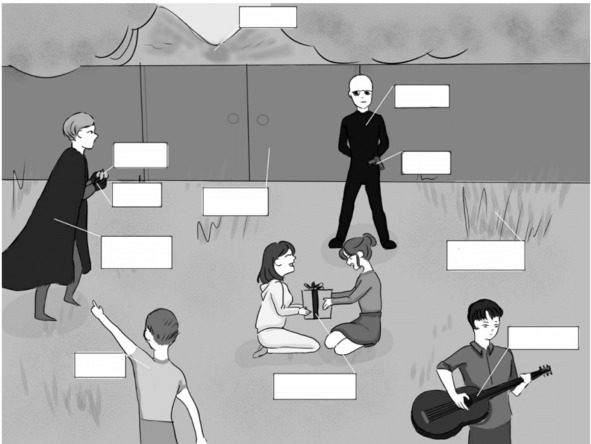
H
Exercise 1. Study the vocabulary
1. habit (n) ['хэбит] – привычка
2. hail (v) [хейл] – приветствовать, поздравлять,
остановить/вызывать такси, автобус
(n) – град
3. handsome (adj) ['хэнсм] – красивый,
привлекательный мужчина
4. hang (v) [хэнг] – вешать
5. harmful (adj) ['ха: мфл] – вредный для здоровья
и т. д.
6. harsh (adj) [ха: ш] – суровые, тяжелые условия
7. harvest (n) ['ха: вист] – урожай
8. headache (n) ['хедейк] – головная боль
9. heap (n) [хи: п] – куча, кипа чего-либо
10. heart (n) [ха: т] – сердце
11. hedgehog (n) ['хеджхог] – еж
12. helicopter (n) ['хеликоптə] – вертолет
13. herb (n) [хёб] – лекарственная трава
14. hint (n) [хинт] – намек
15. hive (n) [хайв] – улей
16. honeymoon (n) ['ханиму: н] – медовый месяц
17. hole (n) [хəул] – отверстие в чем-либо
18. homeless (adj) ['хəумлəс] – бездомный человек
19. horizon (n) [хэ'райзн] – горизонт
20. hygiene (n) ['хайджн] – гигиена
Exercise 2. Match the columns
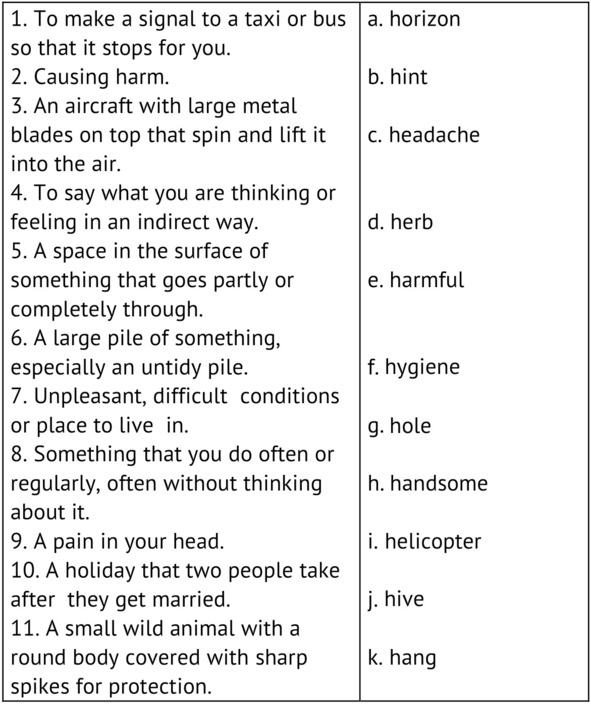
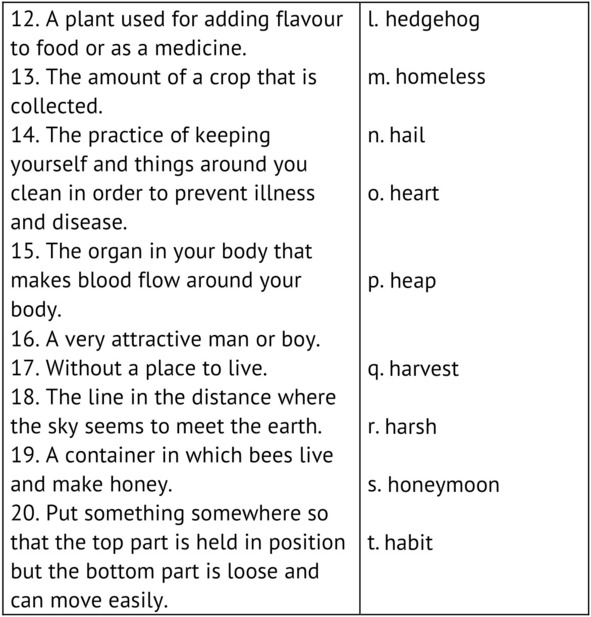
Exercise 3. Translate these short stories
1. Мы приехали к своему другу Марку в гости. Мы засиделись до позднего вечера, солнце уже скрылось за горизонтом. Мы намекнули ему на то, что нам лучше бы остаться у него дома до утра. Но Марк сказал, что у его мамы сильно болит голова и ей нужна тишина. Мы вызвали такси и уехали домой.
.............................................................................................
.............................................................................................
.............................................................................................
.............................................................................................
.............................................................................................
.............................................................................................
.............................................................................................
.............................................................................................
.............................................................................................
.............................................................................................

